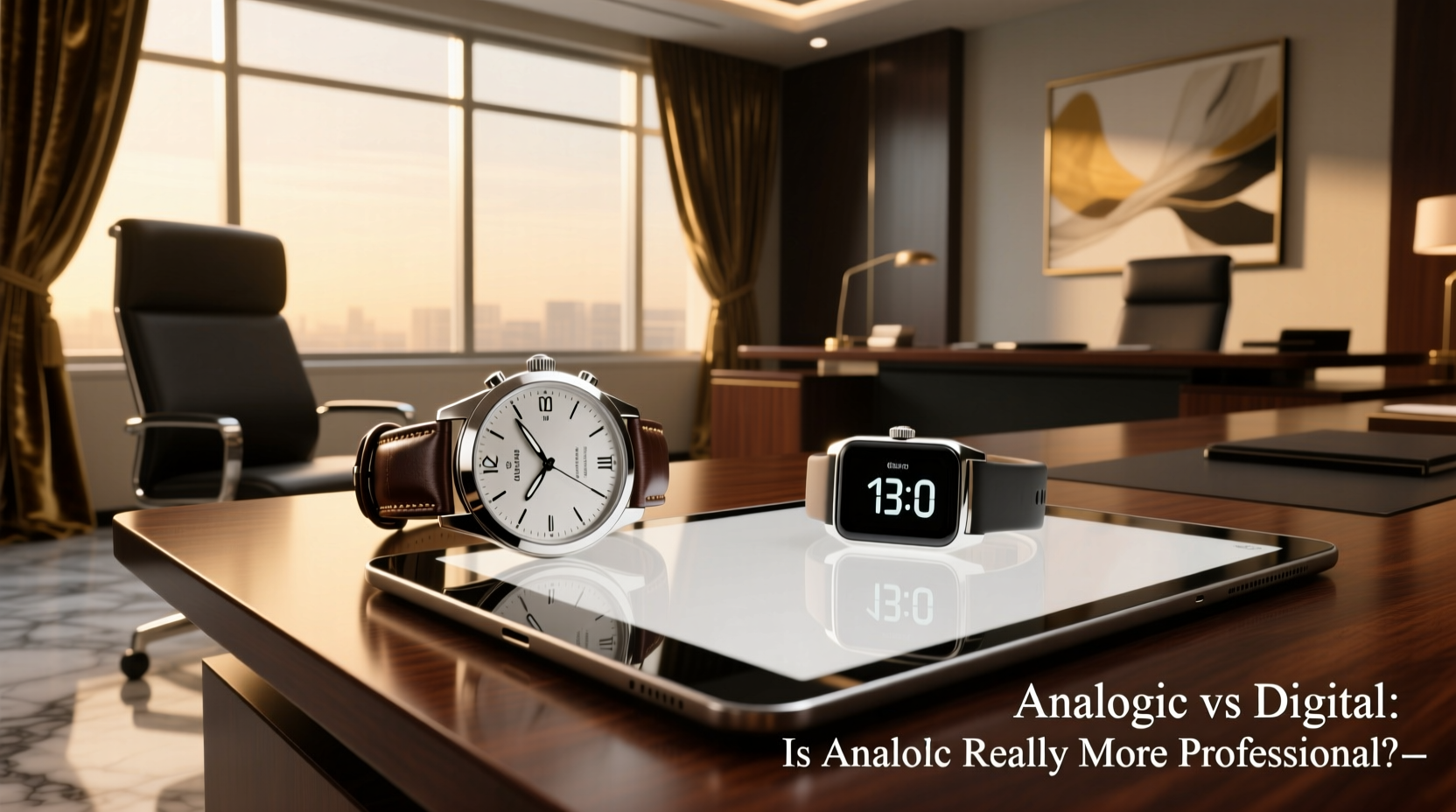In boardrooms, job interviews, and formal gatherings, the wristwatch has long served as a subtle but powerful signal of personal discipline, taste, and professionalism. Yet today, with sleek digital smartwatches dominating tech trends and minimalist analog designs making a comeback, a question persists: does wearing an analog watch truly convey more professionalism than its digital counterpart?
The answer isn't simply yes or no—it depends on context, industry norms, personal branding, and even cultural expectations. While analog watches are traditionally associated with elegance and time-honored tradition, digital watches offer precision, utility, and modernity. Understanding when and why one might be preferred over the other can influence how you're perceived—both positively and negatively.
The Symbolism Behind Analog Watches

Analog watches carry deep-rooted symbolism. Their circular dials, sweeping hands, and mechanical craftsmanship evoke heritage, patience, and attention to detail. In many corporate cultures, particularly in finance, law, and luxury sectors, an analog timepiece is seen not just as a tool for telling time, but as a statement piece.
Consider the classic image of a senior executive in a tailored suit glancing at a thin, silver-cased dress watch during a high-stakes meeting. That gesture communicates control, composure, and adherence to tradition—all qualities associated with professionalism.
“Time is intangible, but the way we represent it says everything about us. An analog watch reflects a respect for continuity and craftsmanship.” — Julian Hartman, Horology Historian and Curator at the National Watch & Clock Museum
This symbolic weight stems from decades of association. Before smartphones and digital displays, analog watches were the standard. They required winding, careful maintenance, and often represented a significant investment. Wearing one signaled responsibility and maturity—traits highly valued in professional environments.
Digital Watches: Functionality Over Form
Digital watches, by contrast, prioritize function. First popularized in the 1970s with models like the Casio F-91W, they deliver exact timekeeping, stopwatch features, alarms, backlighting, and increasingly, health tracking and connectivity. These tools make them ideal for engineers, pilots, athletes, medical professionals, and tech workers.
In industries where precision and efficiency matter more than appearance, a digital watch may actually enhance your professional image. A surgeon timing procedures, a pilot monitoring elapsed flight time, or a software developer tracking sprints benefits from the clarity and responsiveness of a digital display.
However, outside technical fields, digital watches can sometimes be perceived as casual, utilitarian, or even outdated—especially if they resemble retro models or fitness trackers. The same Casio that’s praised for durability among outdoor enthusiasts might be viewed as incongruous in a Wall Street office.
When Digital Enhances Professionalism
- Emergency services: Paramedics and firefighters rely on digital timers and alarms.
- Aviation and navigation: Pilots use multifunctional digital chronographs.
- STEM fields: Scientists and engineers appreciate data-rich interfaces.
- Remote or field work: Rugged digital watches withstand harsh conditions better than delicate analog ones.
The key is alignment: your watch should reflect the values of your profession. In performance-driven roles, capability often trumps aesthetics.
Perception vs. Reality: Does It Really Matter?
Studies in behavioral psychology suggest that people form impressions within seconds of meeting someone—and accessories play a role. A 2018 study published in the Journal of Nonverbal Behavior found that individuals wearing visible luxury watches (predominantly analog) were rated as more competent, trustworthy, and socially dominant—even when all other variables were controlled.
But perception isn’t universal. Cultural differences influence watch preferences. In Japan and Germany, for example, precision and minimalism are prized, making certain digital or hybrid models acceptable—even respected—in business settings. In contrast, Italian and French executives often favor elegant mechanical watches as extensions of their fashion identity.
Moreover, generational shifts are reshaping norms. Younger professionals, especially those in tech startups or creative agencies, may wear Apple Watches or Garmin devices without stigma. For them, being “plugged in” signals relevance and productivity. Meanwhile, older leadership might still associate analog with gravitas.
Industry-Specific Expectations
| Industry | Preferred Watch Type | Rationale |
|---|---|---|
| Investment Banking / Law | Analog (dress or luxury) | Tradition, status signaling, client-facing decorum |
| Technology / Startups | Digital or Smartwatch | Functionality, innovation, connectivity |
| Healthcare (Clinical) | Digital (simple face) | Hygiene, timing accuracy, ease of cleaning |
| Aviation / Military | Digital or Tactical Analog | Durability, legibility, mission-critical functions |
| Fashion / Creative Arts | Statement Analog or Unique Design | Aesthetic expression, brand alignment |
Real-World Example: Two Candidates, One Interview
Imagine two candidates applying for a senior analyst position at a traditional financial firm. Both have similar qualifications. During the final round, one wears a slim Rolex Datejust on a leather strap; the other sports a black G-Shock digital watch.
The hiring panel doesn’t consciously dismiss the second candidate—but micro-impressions accumulate. The analog wearer appears polished, detail-oriented, and aligned with company culture. The digital wearer seems practical but perhaps too informal. Despite equal competence, the first candidate receives the offer.
This isn’t about fairness—it’s about unspoken codes. In conservative environments, conformity to expected norms—including accessories—can tip the balance.
“In high-trust professions, every detail counts. A watch is silent communication. Make sure it’s saying what you want it to.” — Sarah Lin, Executive Coach and Leadership Consultant
Choosing the Right Watch: A Practical Checklist
Selecting the appropriate timepiece for professional settings shouldn’t be arbitrary. Use this checklist to guide your decision:
- Assess your industry’s culture: Is it traditional, innovative, or hybrid?
- Consider your audience: Will clients, seniors, or regulators see your watch regularly?
- Evaluate functionality needs: Do you require timers, alarms, or fitness tracking?
- Match your wardrobe: Leather straps pair well with suits; metal bands suit business casual.
- Avoid extremes: Oversized digital faces or overly ornate analog designs can distract.
- Maintain condition: A scratched or broken watch undermines credibility regardless of type.
- Limit smartwatch visibility: In formal meetings, switch to a classic watch face or remove notifications.
Hybrid Options: The Best of Both Worlds?
Modern hybrid watches blend analog aesthetics with digital intelligence. Brands like Withings, Citizen Eco-Drive, and Frederique Constant offer timepieces with traditional hands and hidden sensors that track steps, sleep, and phone alerts. These allow professionals to appear classic while staying connected discreetly.
For those navigating multiple worlds—say, a lawyer who also runs marathons or a consultant who travels frequently—a hybrid can serve dual purposes. It maintains visual professionalism while delivering useful data behind the scenes.
Still, purists may view hybrids with skepticism. Some argue they dilute authenticity. Others welcome the innovation. As with most things, acceptance grows with familiarity.
Frequently Asked Questions
Is it unprofessional to wear a smartwatch to a job interview?
It depends on the role. In tech or startup environments, a smartwatch may demonstrate engagement with current tools. However, in conservative fields like law, finance, or government, it's safer to wear a traditional analog watch. If you do wear a smartwatch, ensure it’s set to silent mode and avoid checking notifications during the conversation.
Can a digital watch be luxurious or high-end?
Absolutely. While luxury has historically favored mechanical analog watches, brands like Casio (with its G-Shock MR-G line), TAG Heuer (Connected series), and Breitling (Exospace B55) produce premium digital or hybrid models priced in the thousands. Craftsmanship, materials, and limited editions contribute to their prestige.
Does the material of the watch matter for professionalism?
Yes. Stainless steel, leather, and ceramic are generally seen as more professional than plastic or rubber—except in specific contexts (e.g., diving or athletics). A gold or rose-gold finish can convey success but may seem ostentatious in modest workplaces. When in doubt, choose understated materials in neutral tones.
Final Thoughts: Professionalism Is Contextual
So, is an analog watch really more professional than a digital one? Often, yes—but not universally. The perception of professionalism is shaped by environment, expectation, and intent. An analog watch carries centuries of cultural weight, symbolizing refinement and timeless values. A digital watch represents progress, efficiency, and adaptability.
The most professional choice isn’t determined by dial type alone—it’s about congruence. Your watch should align with your role, your audience, and your personal brand. It should support your presence, not distract from it.
You don’t need an expensive timepiece to be taken seriously. What matters is awareness: knowing when to emphasize tradition, when to leverage technology, and how small details contribute to larger impressions.
“The right watch doesn’t make you professional. But the wrong one can make others question whether you are.” — Marcus Reed, Career Image Strategist









 浙公网安备
33010002000092号
浙公网安备
33010002000092号 浙B2-20120091-4
浙B2-20120091-4
Comments
No comments yet. Why don't you start the discussion?